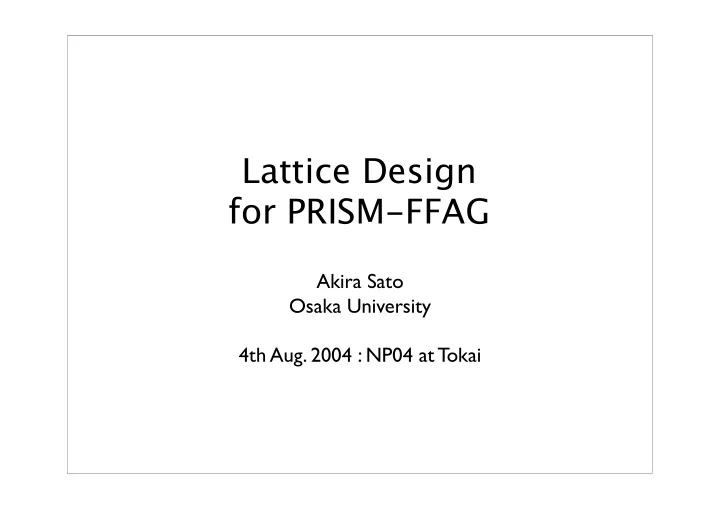

Lattice Design for PRISM-FFAG Akira Sato Osaka University 4th Aug. 2004 : NP04 at Tokai
contents • PRISM overview • PRISM-FFAG dynamics study • method • acceptance • current parameters • summary
PRISM Phase Rotated Intense Slow Muon source Anticipated PRISM beam design characteristics LFV : mu-e conversion 1011-1012 μ /sec muon intensity sensitivity of 10-18 kinetic energy 20MeV high intensity muon beam energy spread +-(0.5-1.0)MeV narrow energy-spread beam repetition 100-1000Hz high purity pion contamination < 10^-18 dedicated for the stopped muon experiments
PRISM Layout Pion capture section The highest beam intensity in the world could be achieved by large-solid angle capture of pions at their production. Decay section π − μ decay section consisting of a 10-m long superconducting solenoid magnet. Phase rotator to make the beam energy spread narrower. To achieve phase rotation, a fixed-field alternating gradient synchrotron (FFAG) is considered to be used. FFAG advantages: synchrotron oscillation need to do phase rotation large momentum acceptance necessary to accept large momentum distribution at the beginning to do phase rotation large transverse acceptance muon beam is broad in space
Construction of the PRISM-FFAG Among the all PRISM components, the phase rotator section can be constructed FY2003 from japanese fiscal year (JFY) of 2003 Lattice design, Magnet design for five years. RF R&D FY2004 RFx1gap construction & test Magnetx1 construction & field meas. FY2005 RF tuning FFAG-Magnet Magnetx9 construction RF PS FFAG-ring construction RF AMP RF Cavity FY2006 Commissioning Phase rotation Kicker Magnet for Injection FY2007 Muon acceleration (Ionization cooling) 5m
toward the high intensity and narrow energy spread muon beam Requirements Optics Design for PRISM-FFAG Large Transverse Acceptance horizontal > 20000 pi mm mrad vertical > 3000 pi mm mrad Long Straight section to install RF cavities magnets : large aperture and small opening angle. non-linear effect and magnetic fringing fields are important to study the beam dynamics of FFAGs.
PoP-FFAG(KEK) TOSCA is the best. but takes much time. conventional method Dr. thesis of M.Yoshimoto
realistic fringing field quasi-realistic magnetic field can model 3D tracking by geant3.21 New method to study dynamics parameters : number of cell FD,DFD,FDF k value F/D ratio gap size to study : acceptance (H,V) tune tune shift beam size etc
How to make quasi-realistic 3D magnetic fields step 1 : calculate magnetic field step 2 : convert the field (B θ ,Bz) to (Bx(~B θ ) ,Bz) of each z- θ cross (Bz,B θ ,Br) by using Maxwell eq. sections (r1-r5). x-axis is considered as θ - axis (approximation). B z ( z i ) = B y ( z i ) F magnet field field D magnet D magnet clump clump r5 B θ ( z i ) = B x ( z i ) r4 B r ( z i ) = dB z ( Z i − Z i − 1 ) + B r ( Z i − 1 ) dr r3 ( Z i ) r2 D F D z r1 step 3 : to make a fine mesh field MAGNET CYCLE = 3420 x ( θ ) r r map, apply a 2D spline x ( θ ) z interpolation to the above field map.
quasi-realistic Comparison (field map) TOSCA Bz(gauss) Bz(gauss) TOSCA quasi-realistic 4000 4000 z=0(cm) z=0(cm) z=3(cm) z=3(cm) z=6(cm) z=6(cm) 2000 2000 z=9(cm) z=9(cm) z=12(cm) z=12(cm) 0 0 -2000 -2000 10 12.5 15 17.5 20 22.5 25 27.5 30 32.5 35 10 12.5 15 17.5 20 22.5 25 27.5 30 32.5 35 theta(deg) theta(deg) 4000 4000 Bt(gauss) Bt(gauss) TOSCA quasi-realistic z=0(cm) z=0(cm) 2000 2000 z=3(cm) z=3(cm) z=6(cm) z=6(cm) z=9(cm) z=9(cm) 0 0 z=12(cm) z=12(cm) -2000 -2000 -4000 -4000 10 12.5 15 17.5 20 22.5 25 27.5 30 32.5 35 10 12.5 15 17.5 20 22.5 25 27.5 30 32.5 35 theta(deg) theta(deg) Br(gauss) Br(gauss) TOSCA quasi-realistic 400 z=0(cm) 400 z=0(cm) z=3(cm) z=3(cm) z=6(cm) z=6(cm) 200 z=9(cm) 200 z=9(cm) z=12(cm) z=12(cm) 0 0 10 12.5 15 17.5 20 22.5 25 27.5 30 32.5 35 10 12.5 15 17.5 20 22.5 25 27.5 30 32.5 35 theta(deg) theta(deg) > 8 hours several min.!
quasi-realistic Comparison (tracking results) TOSCA N=8 k=5 F/D = 7.1 r0=5m
Acceptance Study DFD, N=10, half gap=17cm, w/o field clamps, r0=6.5m for 68MeV/c Horizontal phase spaces are plotted Vertical phase spaces are plotted in in a tune diagram. a tune diagram.
5cm 10cm 15cm 20cm Acceptance dependence on gap size of magnets DFD, N=10, w/o field clamps, r0=6.5m for 68MeV/c
35000πmm mrad 150000πmm mrad 4000πmm mrad Tracking results DFD, N=10, F/D=6, k=4.6, half gap=17cm, r0=6.5m vertical horizontal An effective horizontal acceptance is 35000 pi mm mrad in consideration of correlation between horizontal and vertical acceptance
Parameters of PRISM-FFAG Table 1: Present parameters of PRISM-FFAG Number of sectors 10 FFAG-Magnet Magnet type Radial sector DFD triplet Kicker Magnet Field index ( k -value) 4.6 for Extraction F/D ratio 6.2 Opening angle of magnets F/2 : 2.2deg. D : 2.2deg. Half gap of magnets 17cm RF Cavity Kicker Magnet Maximum field Focus. : 0.4 Tesla for Injection Defocus. : 0.065 Tesla Average radius 6.5m for 68MeV/ c Tune horizontal : 2.73 RF AMP vertical : 1.58 RF PS 5m
Summary • Beam dynamics were studied and optics design were performed for PRISM-FFAG by new method using quasi- realistic fields. • This method enables quick iterations in search of the optics parameters such as tune compared with that of using TOSCA fields. That can be used widely to study and design FFAGs with a complex magnetic field. PRISM-II, NuFact-FFAG ... • The current design has a very large acceptance of 35000 pi mm mrad in horizontal plane. But we still have some items to be studied to finalize the design.
Study items • 6D acceptance with phase rotation. • zero chromaticity • gap size optimization • injection & extraction • ...
Recommend
More recommend